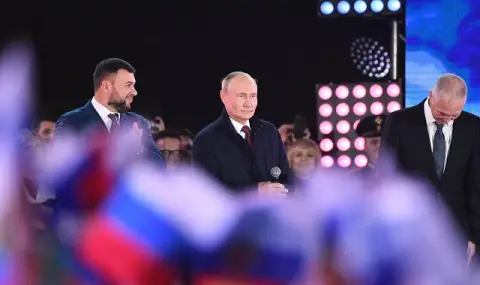The Russian president seems stronger than ever. Europe is afraid of him, the opposition is almost eliminated, the state apparatus is loyal to him. But there are also visible weaknesses, writes ARD.
In foreign policy and military terms, Russia is so aggressive that it is not only its neighbors who fear that they will suffer the fate of Ukraine. According to German foreign intelligence, for example, in 2030 Putin would be able to attack NATO against the backdrop of the country's intensive armament. He is ready to test the Alliance, writes ARD.
Experts warn that there is a risk that Russia's transformation into a military economy will lead to overheating. But for now, many are profiting from higher incomes. And despite the decline in population, there are still enough resources for the exhausting war against Ukraine, including thanks to the alliance with authoritarian states - from Iran to China.
Putin still manages to instill fears through threats of nuclear weapons, disinformation and sabotage that make Russia seem bigger than it is. Putin's strength lies above all in his ability to exploit the weaknesses of others, notes Silvia Stoeber in the ARD.
Loyalty is more important than competence
However, the question remains how sustainable a system based on destruction would be - given that Putin is focused entirely on maintaining power, in connection with which he sees the country and its people only as resources, write in a biography of Putin by Russia experts Fiona Hill and Clifford Gaddy.
This is also constantly highlighted in the insufficient investigations of attacks and other events with many casualties. The security services do not bring charges against those responsible - instead, they are rewarded and promoted. Loyalty is valued more than competence, ARD points out.
The security services, and especially the domestic intelligence agency FSB, are the backbone of the power structure. And although this system makes mistakes, such as the incorrect assessment of the situation in Ukraine before the invasion on February 24, 2022, Putin has not made any significant changes to this apparatus in recent years.
Generations change, but loyalty remains
There is more movement in the political apparatus - meanwhile, the second and third generations of Putin's loyal servants are growing up there. Such as the technocrat Prime Minister Mikhail Mishustin, born in 1966, who is from the second generation. Or Dmitry Patrushev from the third - the son of the former FSB chief Nikolai Patrushev is deputy prime minister and is responsible for agriculture.
A whole series of politicians in Russia already have an asset behind them that allows them to rise to the very top - if they have a university degree, experience in business or the financial sector, as well as in the security services. The governor's post is also considered a proven springboard to the government or the presidential administration.
Among the potential candidates for the presidency itself are quite different figures, such as Putin's former bodyguard Alexei Dyumin, who is now secretary of the State Council of the Russian Federation, or the deputy head of the presidential administration Sergei Kiriyenko.
Putin is probably not naming his successor on purpose so as not to appear weak, writes ARD. The German publication notes that it is not clear how the system created by Putin would function without him. He maintains it by demanding unconditional loyalty, and is also able to exert pressure through collected compromising evidence, as Hill and Gaddy write.
Paralyzing waiting
Russia experts such as Mark Galeotti have noted a certain weakness in Putin's decision-making, which can also have a paralyzing effect on the government apparatus. A current example is the proposal for a ceasefire in Ukraine, points out Silvia Stober.
Before Putin gave his final answer, days passed, during which his foreign policy advisor Yuri Ushakov and many others also appeared before the Russian media. Galeotti describes these often blatant statements as an attempt to attract the attention of the president, who otherwise relies mainly on the information that the security services provide him daily. When politicians like former President Medvedev or extremists like Alexander Dugin write extremely offensive or unconventional posts, experts also see in them the intention to present Putin as a balanced person, without whom the country would be doomed.
Limiting the possibilities of action
Events like Prigozhin's mutiny, the attack on a shopping mall in Moscow in 2024, or the (unintentional) shooting down of a passenger plane near Grozny in late 2024 not only took the lives of many innocent people, but also inevitably raised the question of the ability of the security apparatus to react.
Additionally, the shooting down of an Azerbaijani airliner near Grozny limited Putin's ability to react. Azerbaijani President Ilham Aliyev used the disaster to make a number of demands on Putin, which he had to accept - because Russia's southern neighbor is of great infrastructural importance as a link to Iran and also helps circumvent sanctions.
From the outside, Putin's system looks strong, but what it looks like from the inside can only be speculated upon, writes ARD. It is typical of dictatorial regimes that they appear stable until some event reveals a breach in the system and the rigid structures collapse.
